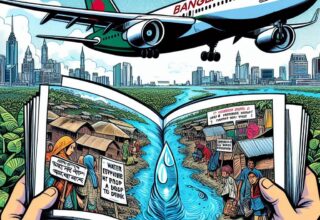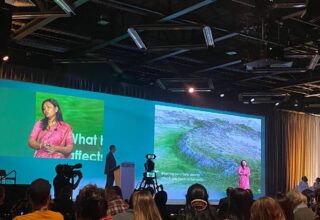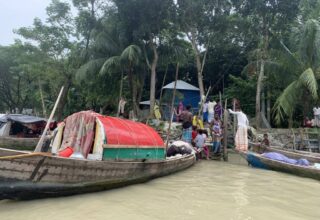This blog is part of ICCCAD Blog Series for World Environment Day 2020. It is a brief story of the relationship between economics and nature in historical perspective – how modern economics evolved from the laws of nature, then severed its relationship largely under neoclassical economics and how it is being repaired in the era of sustainable development and climate change.
Period of Classical Economics
Physiocracy is regarded as one of the first schools of modern economic thought, which arose during the late 18th-the late 19th century. It came from the Greek word “physis,” meaning nature, and “kratia,” i.e. authority. So it was called the `government of nature,’ by the French economist/physiocrat Francois Quesnay and his followers. They viewed in nature, especially in agriculture, the source of wealth, who already predicted natural limits to the growing demand for food. In fact, physiocrats aroused the interest of Adam Smith in Economics, who initially was a moral philosopher. His seminal work `The Wealth of Nations’ was published in 1976. Though Smith differed with Physiocrats about the role of government, he did not undervalue the importance of natural resources in economic development.
During the 2nd half of the 18th century, the formal field of Economics emerged from moral philosophy – how to reconcile individual vs. collective interests. During that time scientists contributed across disciplines. Malthusianism (1798) advocated for restraint in population growth to avoid positive checks from famine – a precursor of carrying capacity concept. David Ricardo (1772-1823) promoted rent-seeking by feudal class, but looked at land only as the base of production and predicted scarcity of good lands. J.S. Mill in the 1860s promoted the concept of `steady-state economy,’ in terms of maintaining a balance between economy and environment, with the promotion of biodiversity. S. Jevons argued for coal as the currency of national power; which then was declining in Britain. Overall classical economics had some grounding on natural resources. Then in the 1870s, Ecology arose from biology, ethology and natural history, when Earnst Haekel defined it as the `Economics of Nature.’
Neo-classical Economics
This began around 1900s. The basic difference between classical and neoclassical economics is that while the former defined prices of products based on the cost of materials and labor, while the latter defined it by the perceived value of consumers. This subjective utility-based approach to pricing contributed to severing its direct link with nature and other material resources, except for land as a factor of production. During this time neo-classical economics focused on a productivist framework, which only valued marketable goods and services, largely overlooking unmarketed eco-system goods and services. It also continued reinforcing infinite substitutability between man-made and natural capital. In that framework only man-made capital was depreciated, but not natural goods and services. Marxism focused on power and equity from the prism of ownership of capital, but no difference it had with neo-classicism in approach to nature.
With the rapid development of science and communication technology, the basic foundations of neoclassical economics and neoliberalism focused on economic growth as the religion of nations. This meant unabated physical expansion of human reach into the frontier lands of nature. In such a model, GDP was calculated based only on marketable and income-earning activities, where welfare was understood mainly as enhancement of income and material consumption. The non-economic welfare derived from ecosystem services or social/human interactions were mostly ignored. A pervasive commodification of nature proceeded under two processes: Extensive, through new resources from nature and oceans being brought into the market, and Intensive, i.e. micro and nano-technologies, genetic technology, etc. The atmospheric sink capacity was also commodified through emissions trading under the Kyoto Protocol, and now under the Paris Agreement.
The era of Sustainable Development
Since the mid-1980s the model of sustainable development espoused by the World Commission on Environment and Development (WCED) can be regarded as the environmental face of market civilization, with prescription of less material and less energy-intensive growth. But the limits of nature were already evident since the 1960s, particularly in sink functions of the environment. The evidences were the disruption of the Ozone shield in the stratosphere, human-induced climate change, extreme level of biodiversity extinction, etc. The human-induced climate change is now the poster child of global diplomacy.
The Convention on Biological Diversity stipulated the concept of sustainable use of natural resources. As conservation agenda introduced under social dimension of sustainable development, some governments recognized local rights of communities in the national Commons. Based on empirically-tested viability models of the Commons’ management (Ostrom), IUCN and WWF gave impetus to co-management models, where governments facilitate the management of natural resources like forests by local communities. The Joint Forest Management in West Bengal/India, pioneered by Dr. Ajit Banerjee, was a successful model, which was replicated elsewhere under the World Bank. Under this neoliberal conservation philosophy, environmental degradation was seen to be emanating from market, institutional and Information failures. So a host of regulatory, economic and social instruments were introduced across the world. Incentive/disincentive schemes included subsidies, charges (taxes, user fees and deposit-refund systems), tradable permits (markets for pollution reduction and tradable development rights), etc.
As a social instrument community-based management was encouraged for sustainability of development works, and public policy-based payment for ecosystem services (PES) was introduced, to pay individuals/communities to undertake actions that increase the levels of desired ecological services. For earning green respectability, companies also entered into contracts with communities for deals, such as fair trade. The REDD+ programme (reducing emissions from deforestation and degradation of forests through conservation) is another incentive-based programme under the UNFCCC. From biodiversity conservation perspective, carbon focus under the REDD+ tended to neglect the rights of local and indigenous communities, which is regarded by some as carbon colonialism or carbon capitalism.
But the foundations of the UNFCCC, i.e. neoliberal market system was failing to internalize the environmental externalities, such as emissions reduction and environmental degradation including biodiversity extinction. Under this scheme, polluter-pays-principle was not recognized for application beyond a country’s border. So export of emissions continued unabated, with increasing impacts of climate change on the poorest of the world.
A New Paradigm is needed to attenuate market fundamentalism
The global community is inching forward to reconstruct the severed relationship with nature under the mainstream paradigm of market fundamentalism. But it is failing, because it does not challenge the basic premises, such as markets inability to internalize externalities and policy failures in a wider world. Here comes the new thinking of Ecological Economics, which differentiates between growth and development. The former is seen purely as `physical expansion,’ while the latter is construed as `improvement in quality.’ The global ecological system is like a mother’s womb – an ever-growing baby cannot be sustained by the womb’s limited space. In like manner, global economy cannot grow/expand in physical terms ad infinitum in a bounded ecological system. So the scale of the economy (in physical terms) must be checked in order to restore balance with nature.
As an accompaniment, the Political Ecology as a new discipline comes in to answer the question of distribution while correcting the imbalance. It is a powerful discourse combining elements of ecology and political economy, which can be regarded as a new kind of political economy. This seeks to ground the centralist hierarchies in governance to place and people, with communities controlling most of their life needs, as in Switzerland. As ecosystems and species habitats are local, political economy is also local, as a new territoriality connecting the community with space, which draws on the neo-Gramscian analysis of power relations in the society.
While Ecological Economics is largely a technical and policy-oriented endeavor, Political Ecology primarily concerns for spatial relations, both natural and social, within which to embed economic processes. In the environmental sphere, there is a structural antipathy to central regulation of ecological resources; so a new kind of approach, called `eco-system-based management (EBM) is advocated (CBD, UNFCCC, IUCN), which grounds economic activities to fit within healthy ecosystems. This is not just technical, but transformative of the industrial/centralist /corporatized model. This may contribute to turn on its head the existing approach of global-local to local-global, reconstructing what has been deconstructed during the 20th century – human persons are embedded in spatial communities.
The COVID-19 world is a stark reminder that human systems have crossed the natural limits of nature. A number of studies show that deforestation and loss of wildlife caused increases in infectious diseases. Coronavirus also erupted from a wildlife market in Wuhan. In response, China and Vietnam banned trading in wildlife. As the World Economic Forum’s Nature Risk Rising Report highlighted, half of the world’s GDP is highly or moderately dependent on nature. For every dollar spent on nature restoration, at least 9-10 times of economic benefits can be expected. So should we not be asking ourselves: can we use the opportunity in a post-COVID world to learn from our mistakes and build something better? Do we must to survive!
About the Author:
Prof. Mizan R. Khan is Deputy Director at ICCCAD and is serving the Programme Director for LUCCC.






